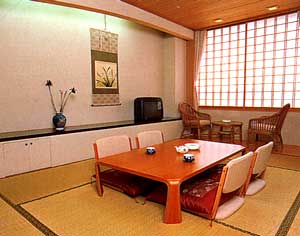Friday, September 19, 2008
Cash Society Japan
Of course, if you want cash we've got both yen and dollars on J-List.
Food Fraud
Each year the organization that publishes the Standardized Kanji Test announces the "kanji of the year," the character that best sums up the events of the past twelve months. Previous characters have included inochi (life) in 2005 to mark the terrible young lives lost in suicides that year, tora (tiger) due to the historic Hanshin Tigers' victory in the Japan pennant, and ikusa (war) in 2001, when the U.S. invaded Iraq. The kanji of the year for 2007 was nise (nii-SAY), meaning "fake" or "fraud," due to the large number of food-related scandals that became news, including a famous restaurant caught labeling normal meat as high-grade Kobe beef and serving leftovers to customers, a confectionery company that sprayed water on stale slices of cake so they'd look fresh enough to sell, and Hokkaido-based "Meat Hope," which despite its awesome name got in trouble for intentionally mis-labeling its products. So far, 2008 has been more of the same as food scandals continue. The most egregious one so far has been a company called Mikasa Foods, which bought inedible rice that had been contaminated with pesticides and seawater (it said) for use in glue production. In reality, it relabeled the rice and sold it to more than 370 companies, which used it to manufacture everything from food to sake to beer and more -- bleah.

Fall Traffic Safety Week
Yes, nothing gets the chicks like traffic safety awareness.
Wednesday, September 17, 2008
Ne-ver Ending Japanese Grammar Lesson
You'd like two glasses of iced coffee, is that right?
今日は、暑いですね。Kyou wa atsui desu ne.
It's hot today, isn't it?

All About Older Japanese
Most Western nations are facing the problem of ageing populations, but Japan is really leading the pack, with its combination of a very low birth rate, healthier diet and a good medical system. Japanese older people are just like elderly from any other part of the world, sometimes friendly and interesting to talk to, and other times unwilling to take crap from anyone as they dive for the last pair of shoes at a department store bargain sale. As an American living in Japan, it's can be interesting to strike up conversations with older Japanese, who will often talk about what the war years were like for them, or the time they saw General MacArthur, and there's an unspoken acknowledgement of all that's changed in the past 60 years. Since it's generally expected that the oldest son or daughter will take over the family house and care for the parents in their silver years, elderly folks generally have the benefit of lots of family around them, at least in the semi-rural prefecture where I live. Partially because of this system, and also (I've been told) because Japanese rarely leave the area where their family grave is located, you don't see people migrating to a different part of the country when they retire as is the case with Florida. The main social activity of Japanese retired people seems to be going to the doctor's office every day to sit and chat with friends while they wait to be seen by the doctor for some (usually imagined) pain, and if you ever get sick in Japan you'd better have a strategy for getting to the doctor's office early. While most of the older people living in my neighborhood are very genki (healthy, full of energy), there's one poor woman whose back is stuck at a 90 degree angle, making her unable to stand up at all. I'd always assumed this problem came a lifetime of planting rice by hand, but supposedly it's caused by a chronic vitamin B1 deficiency that was a chronic problem in the first few decades of the 20th century.

Social Security Hotel
I went to Tokyo to meet a friend yesterday. He's working for the prestigious Tokyo University, the top ranked school in Japan, and it was interesting to take in a part of the city I'd not seen much of before. The hotel we stayed at was called Eminasu, and I was surprised to see a large sign stating proudly that the hotel had been built with money from the National Pension System, the equivalent to Social Security in Japan. Yes, there's so much money sloshing around in funds like the pension system and Japan Post deposit accounts that legislators are quite unable to keep their paws off it, and regularly launch grand hakomono (lit. "box-thing") construction projects to foster economic development, provide services for citizens and (of course) secure lucrative employment for the former government employees who were directly involved with said projects when they retire. (This is known as amakudari or "descent from heaven.") Sometimes the system works okay, as in the case of the hotel we stayed at, providing a good room at a slightly subsidized rate since the government-operated hotel didn't need to generate a profit. But there are plenty of horror stories of massively wasteful construction projects made with taxpayer funds, like a sprawling resort hotel at the top of a mountain that no one ever stayed at and a now-bankrupt theme park designed as a replica of a Turkish village, complete with a full-sized Trojan horse. How fitting.
They have these hotels all over. You can stay at this one in Kyoto if you like.My hotel room was $80 per night, so I presume the ones in Kyoto will likely be the same.
The rooms certainly look nice!

Tuesday, September 16, 2008
Japan's Internet is #1 in the World
Japan has the best Internet connectivity in the world, according to a newly released study which compared actual data-transfer rates and overall customer satisfaction by Internet users around the world. Sweden came in second, followed by the Netherlands (#3), South Korea (#5), Germany (#9), France (#12), the U.S. (#16) and the U.K. (#24). The results were interesting to me because Japan lagged behind the rest of the world in adopting the Internet throughout the 1990s, with significantly higher prices and lower connection speeds. A lot of the slow Internet development was due to NTT, the 800 lb gorilla of the telecommunications world here, a former government-run monopoly that owned all the lines ISPs needed to lease in order to do business, and which generally kept a lot of competition out of the marketplace by functioning as the country's largest ISP directly. It turns out that having a less competition might have been a good thing in the case of Japan, since NTT and its subsidiary companies were able to execute technology roll-outs more efficiently than if it'd been up to a hodge-podge of companies, as is the case with the U.S. J-List connects to the net through hikari fiber or an optical fiber line, although it was a long wait to get our office wired for the fast connection. We actually had to make a formal request to the mayor's office (my wife happens to have the same last name as him, so we let the staff think we were related), and they passed along our request to NTT, who made sure J-List was the first customer connected in our city. Having fast, efficient Internet despite the lack of competitive pressures might seem puzzling, but it's quite common for Japan to seemingly violate the rules of Capitalism yet have things turn out okay in the end.

Wither Morality in Japan?
"Children who are able to greet others properly won't be steered wrong in life." This is one of the many tidbits of wisdom hung on metal signs put up by our local PTA, and every time I drive down a street I haven't been on before I'm strangely compelled to keep my eyes open for new signs. "People who don't show respect to their parents won't receive it from their own children." Japan is a unique industrialized nation in that its ideas on morality were never based on the Bible, unlike Western countries, and I've always been interested in how the Japanese define the concept. All elementary school kids have a class called dotoku (morality) in which they learn about various (of course secular) issues, such as how recognize and stop ijime, how to be thankful to others, and so on. "Weak-minded children are caused by over-protective parents." Yes, pinning down the basis of Japan's thinking on morality is a challenge. Is it based on Buddhism? I haven't been able to identify any active lessons that Japanese Buddhism imparts to its followers other than to be respectful of your family members, especially those who have gone on to the next world. It's a question I hope to find the answer to some day.
This one says, "Parents show their loving concern for their children when they offer advice to them." Sounds lame in English but better in Japanese.
A Taco Revolution in Japan?
"How many Taco Bell sauce packets do you have in your glove compartment?" I've got a lot, and whenever I go to the U.S. I make sure to bring back more, since they're awfully convenient and taste good, too. We had soft tacos for dinner the other day, and it was a reverent experience, with everyone making each taco with care and eating it slowly, savoring each bite. Unlike Hong Kong with its mish-mash of food cultures, with all manner of cuisine from Asia, Europe and everywhere else mixed together, Japan can be rather closed-minded about what it eats, which makes it hard to find some of my favorite items. The amazing thing about the tortillas we ate this time, though, was that they were bought here -- I kept re-reading the Japanese text on the package, unable to believe my eyes. Could this be the beginning of a renaissance of culinary internationalization in Japan? My fingers are so crossed.


